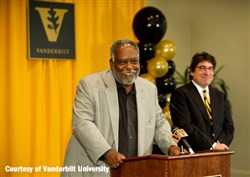 Home > Article
Home > Article
VOL. 36 | NO. 50 | Friday, December 14, 2012
VU's Williams: Coaching hires, retention key to success
By Brandon Gee

Vanderbilt University Chancellor Nicholas S. Zeppos, right, announcing the new role for Vice Chancellor David Williams in July, 2012. Williams now has the title of vice chancellor for athletics and university affairs and athletics director.
-- Vanderbilt UniversityVanderbilt University’s David Williams was given a new role at the school in mid-July, a reflection of his success in leading Commodore athletics to new heights.
A tenured faculty member of Vanderbilt Law School, Williams served as vice chancellor for university affairs and athletics, general counsel and university secretary until summer when
Chancellor Nicholas S. Zeppos asked Williams to take on an expanded role in athletics.
When Zeppos made the announcement, he said: “By every measure, the game has changed for Vanderbilt athletics over the past nine years. Our efforts to ensure that Vanderbilt athletes are students first have paid off on the playing field, in recruiting, in the classroom and across our campus. The success is largely thanks to David Williams.’’
Zeppos says that the change allows Williams to have a leadership role in the national reform agenda for college sports as well as continuing to lead the successful integration of Commodore athletics into the total student life experience.
Williams offers his thoughts on his national role and on his work with Vanderbilt athletics:
You are heavily involved in NCAA President Mark Emmert’s intercollegiate reform effort and a member of a working group on enforcement. What is on the reform agenda and what is the most meaningful step being taken?
“I think the one that’s going to have the most impact is the new violation and penalty scheme. A provision says head coaches are presumed to be responsible for any violation that occurs with their team or staff. I think that will really change the whole concept of risk versus reward.
“What people felt was there were many cases that came up when the head coach knew or should have known what was going on. This really sends the message to the head coach that you are responsible for what’s going on, for doing your due diligence to make sure the rules are being followed and to set the right tone.”
Vanderbilt doesn’t mince words when it says athletes are students first. Does that commitment put you at a competitive disadvantage, particularly in a premiere athletic conference like the SEC where schools provide for academic and admissions ‘flexibility’ for athletes?
“I think there was a point in time when we thought there was some disadvantage. I think we’ve overcome that by embracing what we are. People are recruiting against us and saying, ‘At Vandy, you have to go to class.’ But students and parents have started to appreciate that you do have to go to class here.
“That’s the whole point. Anybody who suggests you shouldn’t do that, is that really where you want to be?
“We say to our student athletes, ‘We want you to experience some of the things other students get to do.’ For example, 70 percent of Vanderbilt students study abroad. We’ve created a plan where we actually pay for 15 to 20 of our student athletes to study abroad.
“I think the whole concept of we’re going to see you as a student first has really resonated. We hope when you leave here, you leave here with a Vanderbilt degree. If there’s any flexibility at all, at the end of the day, these students still graduate.”
Much was made of the 2003 restructuring of the athletic department that brought it under the thumb of the university’s broader academic mission. Was that change as monumental as it was portrayed? What changed as a result of that change, and what have been the largest long-term impacts nearly a decade later?
“I do believe there was a degree of overblown-ness to it. People ran with it. But it did give us the opportunity to refocus in such a way that we really had to make sure we knew who we were. Prior to the restructuring, we sort of had an attitude where mediocrity was OK and accepted. That was because there was a battle at this university. Maybe athletics felt like we’re not excellent like the rest of the institution. And on the other hand, there was a fear that if we’re successful on the playing field, does that mean we’re not as good academically?
“My argument has always been that’s not what you see at Stanford. It was necessary for us to step back and come at this in a new way. I think (the restructuring) was necessary for athletics to truly be a part of the university.”
To what else would you attribute Vanderbilt’s recent athletic successes?
“We’ve been able to assemble a great collection of coaches. They’re people who understand who we are and what we want to be. We’re not on a coaching carousel any more. We’re not longer a stepping stone.”